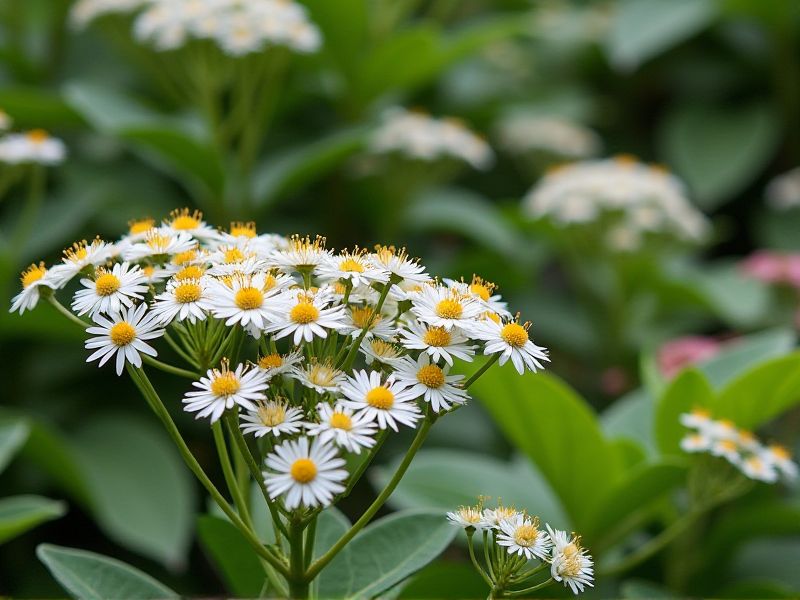
In Japanese gardens, plants such as bamboo, cherry blossoms (sakura), and Japanese maple embody the essence of peace. Bamboo, with its graceful growth and flexibility, represents resilience and strength, harmonizing with the garden's tranquil atmosphere. The delicate beauty of cherry blossoms signifies the fleeting nature of life, inviting contemplation and serenity. Japanese maple, with its vibrant foliage, symbolizes balance and harmony, enhancing the restful ambiance of your garden space. Together, these plants create a serene environment that fosters introspection and a deep connection to nature.
List of some Japanese garden plants that symbolize peace
- Bamboo (Bambusoideae)
- Japanese Maple (Acer palmatum)
- Camellia (Camellia japonica)
- Cherry Blossom (Prunus serrulata)
- Azalea (Rhododendron spp.)
- Fern (Polypodiopsida)
- Wisteria (Wisteria floribunda)
- Moss (Bryophyta)
- Pine (Pinus thunbergii)
- Lotus (Nelumbo nucifera)
Important things about Japanese garden plants that symbolize peace
Bamboo
Bamboo is a prominent plant in Japanese gardens, symbolizing peace, resilience, and harmony. Its versatility allows it to be used in various design elements, from privacy screens to graceful water features, creating a serene atmosphere. When choosing bamboo varieties for your garden, consider options like *Phyllostachys aurea* or *Fargesia murielae*, known for their elegant growth and low maintenance. These plants, along with moss and stone, contribute to the tranquil aesthetic, embodying the philosophy of wabi-sabi, which embraces the beauty of imperfection and the natural cycle of growth and decay.
Cherry Blossom
Cherry blossoms, or sakura, are celebrated as iconic symbols of peace and renewal in Japanese gardens. Their delicate pink and white flowers bloom in spring, representing the transient beauty of life and the importance of living in the moment. Incorporating cherry trees into your garden not only enhances its aesthetic appeal but also creates a serene atmosphere that invites reflection and tranquility. Alongside other Japanese garden plants like bamboo and moss, cherry blossoms contribute to a harmonious landscape that embodies the essence of Zen philosophy.
Plum Blossom
Plum Blossom, or Ume, is a revered symbol of peace and resilience in Japanese gardens, flourishing in late winter and heralding the arrival of spring. Its delicate pink and white flowers embody the transient beauty of life, often associated with purity and renewal. In Japanese culture, the Plum Blossom represents hope, as it blooms even in the coldest months, reminding you that tranquility can emerge from adversity. Embracing the Ume in your garden can create a serene atmosphere, inviting contemplation and harmony in your outdoor space.
Japanese Maple
The Japanese Maple (Acer palmatum) is a cherished symbol of tranquility in Japanese gardens, embodying grace and harmony. Its delicate, feathery leaves exhibit vibrant hues of red, green, and gold, enhancing the serene aesthetics of garden spaces while fostering a peaceful ambiance. Known for its ability to thrive in shaded areas, this versatile tree serves as a focal point, inviting contemplation and reflection. Incorporating a Japanese Maple into your garden not only enhances its beauty but also deepens the connection to the calming principles of nature.
Pine Tree
In Japanese gardens, the pine tree, or "Matsu," symbolizes longevity and peace, representing resilience and steadfastness. Its evergreen nature maintains beauty throughout the seasons, creating a calming atmosphere ideal for meditation and reflection. Often featured in rock gardens or arranged within traditional tea ceremonies, the pine embodies harmony with nature, inviting tranquility into your landscape. The thoughtful placement of these trees enhances the serene aesthetic, connecting you to the profound Zen principles that characterize Japanese garden design.
Lotus
In Japanese gardens, the lotus (Nelumbo nucifera) stands out as a powerful symbol of peace and tranquility. Its ability to rise beautifully from murky waters embodies the concept of overcoming adversity, making it a cherished element in many traditional landscapes. Additionally, plants like the cherry blossom (Sakura) and bamboo are often included for their serene aesthetics, reflecting the fleeting nature of life and encouraging mindfulness. Incorporating these plants into your garden can create a serene sanctuary that promotes relaxation and inner peace.
Azalea
Azaleas, particularly the Japanese varieties such as Rhododendron obtusum, are cherished in Japanese gardens for their stunning blooms and symbolism of peace and tranquility. These flowering shrubs thrive in well-drained, acidic soil and prefer partial shade, making them ideal for serene garden settings. Often associated with mindfulness, azaleas foster a tranquil atmosphere, inviting contemplation and reflection. Incorporating azaleas into your landscape not only enhances its aesthetic appeal but also creates a harmonious environment that resonates with traditional Japanese horticultural principles.
Camellia
Camellia, a revered plant in Japanese gardens, symbolizes peace and tranquility, making it a perfect addition to your serene landscape. These evergreen shrubs produce exquisite blossoms that bloom in early spring, often in shades of pink, white, and red, offering a vibrant contrast against lush green foliage. The delicate flowers of Camellia represent unwavering love and admiration, deeply rooted in Japanese culture, where they are often associated with the harmony of nature. When strategically placed, Camellia can enhance the calming atmosphere of your garden, providing a focal point that invites reflection and serenity.
Iris
The Japanese garden is a serene haven, where plants are chosen not only for their beauty but also for their symbolic meanings. One such plant is the Iris, which represents purity and tranquility, making it a perfect addition to a peaceful garden atmosphere. Utilizing different varieties of Iris, like the bearded or Japanese Iris, can create a captivating visual experience that enhances the calm ambiance. Incorporating these elegant blooms into your landscape offers a gentle reminder of nature's harmony and serenity.
Ferns
Ferns, a staple in Japanese gardens, symbolize peace and tranquility while contributing to the serene aesthetic of these landscapes. Varieties such as the Japanese painted fern and the lady fern showcase delicate fronds and intricate patterns, enhancing the calming atmosphere. By incorporating ferns, you can create a lush environment that promotes relaxation and mindfulness, aligning with the principles of Zen gardening. Their ability to thrive in shaded areas further emphasizes the harmony between nature and design in Japanese gardens.
